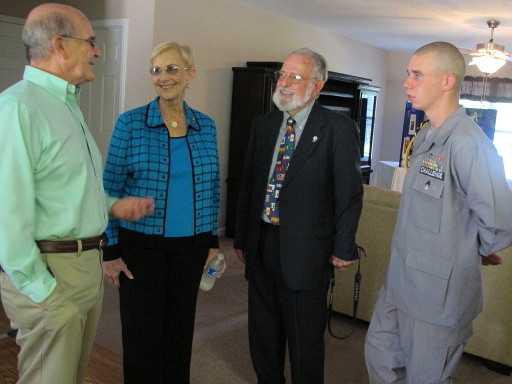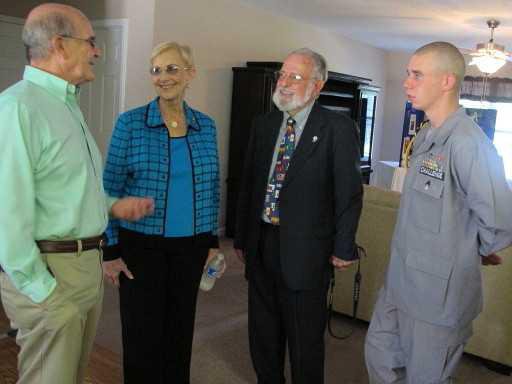A small sign on the wall in the kitchen/dining room reads, "Hope," suggesting that hope is one of the many services provided by the Tri-County Protective Agency Inc., an emergency shelter for victims of domestic violence.
The litany of services offered by the shelter, plus its confidential location, make it a virtual sanctuary for the women and children seeking a safe place to stay for a few nights or a few months.
Georgia’s first lady, Sandra Deal, stopped by the shelter Wednesday during a fact-finding tour of five domestic violence shelters in Coastal Georgia. The first lady is the chairwoman of the advisory board for the Governor’s Office for Children and Families. Her visit had special significance because October is National Domestic Violence Awareness Month.
According to the agency’s director, Paula Foerstel, among the list of services the nonprofit agency provides are emergency shelter, food, support sessions, transportation, temporary protective orders, escorts to court, children’s programs and rental assistance. She said her trained staff members are on duty 24 hours a day, seven days a week, including holidays.
"Some residents stay longer than others," Foerstel said. "The average stay is 45-90 days. It depends on what their goal is. We give them one-on-one support, according to their individual needs."
Assistant Director Cheryl Hughes said the shelter, which was built in October 2010, replaced a much older two-home complex on the same site. The new shelter has all the appearances of a normal home. Residents even share household duties to lower costs, she said.
She added that because of its secluded, secret location, there have been few incidences at the shelter. If a husband or boyfriend inadvertently shows up at the door, she said the staff will not let him in, and if he will not leave, they call the sheriff’s office. She said a deputy is usually there within minutes of the call. In at least one incident, she said, the husband was arrested for violating a restraining order.
"This is nice," the first lady said of her first impression of the home as she was guided from room to room. "I know y’all are very proud."
Deal was shown a memorial table with pictures of women and children with a connection to the shelter who were murdered outside the shelter. The first lady was visibly moved by the story of a child who was murdered by his stepfather, who also murdered his mother and sister. Foerstel explained the connection each woman and child had had with the shelter and added that the children’s programs were intended to help the children to understand that violence is not simply a way of life.
"You’ve got to stop the violence early so maybe the children won’t grow up to be violent," Deal agreed.
The first lady said her tour not only included the domestic violence shelters but also an after-school program in one community and a visit to an elementary school in Milledgeville. It was a busy schedule, Deal admitted, but she said she had to use time wisely.
The first lady said she wanted to convey to women and children caught up in domestic violence situations that there is help out there. She also said she wanted to bring attention to the problem of domestic violence in Georgia.
The first lady emphasized that even though there is very little extra money to assist shelters like the Tri-County Protective Agency, support and assistance from community and church leaders can and has made a difference. She noted, for example, the need for a fence and security cameras at the Tri-County shelter and said she was willing to "shine a little light" on that need and maybe get something done about it.
The Tri-County Protective Agency shelter provides support for domestic violence victims in five counties, not three: Liberty, Long, Bryan, Evans and Tattnall counties.

